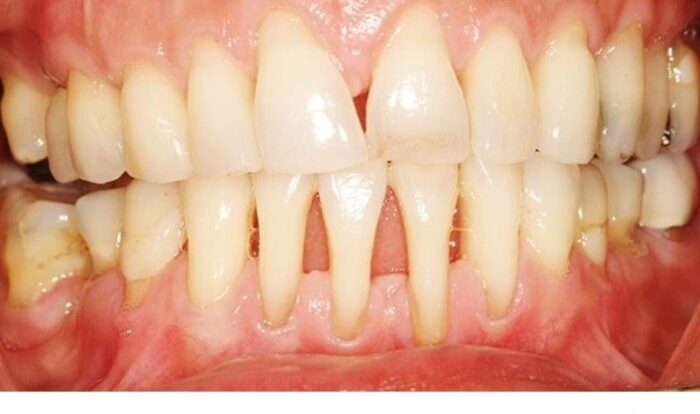
Discover how to cure gum disease without a dentist! This guide explores natural remedies, over-the-counter treatments, oral hygiene practices, dietary modifications, and more to help you maintain healthy gums and a dazzling smile.
Gum disease, a common oral health issue, can lead to pain, bleeding, and even tooth loss. Fortunately, there are effective ways to manage and even reverse gum disease without the need for costly dental visits. Read on to learn how you can take control of your gum health today.
Home Remedies

Home remedies can provide some relief from gum disease symptoms, but it’s important to note that they are not a substitute for professional dental care. If you have severe gum disease, it’s essential to consult a dentist for proper treatment.
Gum disease is a common problem, but it doesn’t have to be treated by a dentist. There are a number of natural remedies that can help to cure gum disease, including using a saltwater rinse, brushing with baking soda, or applying tea tree oil.
If you’re looking for more information on how to cure gum disease without a dentist, check out Mecklenburg Mecconline . They have a wealth of resources on the topic, including articles, videos, and even a forum where you can ask questions and get advice from other people who have cured their gum disease naturally.
Here are a few natural remedies that may help alleviate gum disease symptoms:
Saltwater Rinses, How to cure gum disease without a dentist
Saltwater rinses can help reduce inflammation and kill bacteria in the mouth. To make a saltwater rinse, dissolve 1/2 teaspoon of salt in 8 ounces of warm water. Rinse your mouth with the solution for 30 seconds, twice a day.
Tea Tree Oil
Tea tree oil has antibacterial and anti-inflammatory properties that may help reduce gum disease symptoms. Add a few drops of tea tree oil to a cup of water and rinse your mouth for 30 seconds, twice a day.
Baking Soda
Baking soda can help neutralize acids in the mouth and reduce inflammation. To make a baking soda rinse, dissolve 1/2 teaspoon of baking soda in 8 ounces of warm water. Rinse your mouth with the solution for 30 seconds, twice a day.
Over-the-Counter Treatments
Over-the-counter (OTC) products can help manage gum disease symptoms and improve oral hygiene. These products contain active ingredients that target specific aspects of gum disease, such as inflammation, bacteria, and plaque buildup.
Before using any OTC products for an extended period, consult a healthcare professional for personalized advice and to rule out any underlying medical conditions.
Mouthwashes
- Active Ingredients:Chlorhexidine, cetylpyridinium chloride (CPC), essential oils
- Mechanism of Action:Kill bacteria, reduce inflammation, and freshen breath
- Potential Side Effects:Staining of teeth, altered taste perception, and mouth irritation
Gels
- Active Ingredients:Metronidazole, doxycycline
- Mechanism of Action:Antibacterial and anti-inflammatory properties
- Potential Side Effects:Gum irritation, nausea, and taste disturbances
Toothpastes
- Active Ingredients:Triclosan, stannous fluoride, baking soda
- Mechanism of Action:Reduce plaque buildup, fight bacteria, and strengthen enamel
- Potential Side Effects:Tooth sensitivity, gum irritation, and allergic reactions
Oral Hygiene Practices: How To Cure Gum Disease Without A Dentist
Maintaining impeccable oral hygiene is the cornerstone of preventing and managing gum disease. Implementing these essential practices will help you maintain a healthy smile.
To achieve optimal oral hygiene, follow these guidelines:
Proper Brushing and Flossing Techniques
Mastering the correct techniques for brushing and flossing is crucial for effective plaque and bacteria removal. Brush your teeth at least twice a day, ideally after meals, using a soft-bristled toothbrush and fluoride toothpaste.
Angle the toothbrush at a 45-degree angle towards the gum line and gently brush in circular motions. Pay special attention to the areas where plaque tends to accumulate, such as the back molars and the gum line.
Flossing once a day is equally important. Gently slide the floss between your teeth, reaching below the gum line to remove plaque and food particles.
Use of Antimicrobial Mouthwashes
Antimicrobial mouthwashes can be an effective adjunct to brushing and flossing. They contain active ingredients that help kill bacteria and reduce inflammation in the mouth.
Gum disease can be a pain, but there are ways to cure it without a dentist. One way is to use a mouthwash that contains chlorhexidine. This ingredient is known to kill bacteria that cause gum disease. Another way to cure gum disease without a dentist is to use a toothpaste that contains fluoride.
Fluoride helps to strengthen teeth and prevent cavities, which can lead to gum disease. You can also try using a waterpik to clean your teeth and gums. A waterpik is a device that uses a stream of water to remove plaque and bacteria from your teeth and gums.
If you have gum disease, it’s important to see a dentist to get it treated. However, there are some things you can do at home to help cure gum disease without a dentist. How to cure gum disease without a dentist
Choose an antimicrobial mouthwash that contains ingredients like chlorhexidine or cetylpyridinium chloride. Use it as directed on the label, typically twice a day after brushing and flossing.
It’s no secret that gum disease can be a real pain, but what if you don’t have the time or money to see a dentist? Luckily, there are plenty of ways to cure gum disease without a dentist . From natural remedies like oil pulling and salt water rinses to over-the-counter treatments like antibiotics and mouthwashes, there are plenty of options to choose from.
So what are you waiting for? Start curing your gum disease today!
Regular Dental Checkups and Cleanings
Regular dental checkups and cleanings are essential for maintaining good oral health and preventing gum disease.
Gum disease is a common problem that can lead to serious health issues if left untreated. While it’s always best to see a dentist for professional treatment, there are some things you can do at home to help cure gum disease.
For more information on how to cure gum disease without a dentist, check out this helpful article: How to Cure Gum Disease Without a Dentist . You can also find additional tips and advice on how to prevent gum disease from recurring in the future.
During a checkup, your dentist will examine your teeth and gums for signs of gum disease. They will also clean your teeth to remove plaque and tartar buildup. The frequency of your checkups and cleanings will depend on your individual needs and risk factors for gum disease.
There are many ways to cure gum disease without a dentist, such as practicing good oral hygiene, flossing regularly, and using an antibacterial mouthwash. If you’re looking for more information on how to cure gum disease without a dentist, check out this helpful article: how to cure gum disease without a dentist . It provides step-by-step instructions on how to treat gum disease at home.
Dietary Modifications
Proper nutrition plays a crucial role in maintaining gum health. A balanced diet rich in essential vitamins, minerals, and antioxidants can strengthen the gums and reduce the risk of gum disease. Conversely, certain foods and beverages can contribute to gum inflammation and disease.
Foods and Beverages to Avoid
- Sugary Drinks:Soda, juice, and other sugary beverages create an acidic environment in the mouth, which can erode tooth enamel and weaken the gums.
- Processed Foods:These foods are often high in refined carbohydrates, which can feed bacteria in the mouth and contribute to plaque formation.
- Sticky Candies:These candies tend to cling to the teeth, providing a breeding ground for bacteria and increasing the risk of cavities and gum disease.
- Alcohol:Excessive alcohol consumption can dry out the mouth, reducing saliva production and increasing the risk of gum inflammation.
- Tobacco:Smoking damages the gums and weakens the immune system, making them more susceptible to infection.
Foods and Beverages to Include
- Fruits and Vegetables:Fruits and vegetables are rich in vitamins, minerals, and antioxidants, which help strengthen the gums and protect against infection.
- Whole Grains:Whole grains are a good source of fiber, which helps stimulate saliva production and remove bacteria from the mouth.
- Dairy Products:Dairy products contain calcium, which is essential for strong teeth and bones. They also contain proteins that can help reduce inflammation.
- Green Tea:Green tea contains antioxidants that can help fight bacteria and reduce inflammation in the gums.
- Water:Water helps keep the mouth hydrated and washes away bacteria and food particles.
Risk Factors and Prevention
Gum disease is a common problem that can lead to serious health issues if left untreated. There are several risk factors that can increase your chances of developing gum disease, including:
- Smoking
- Poor oral hygiene
- Certain medical conditions, such as diabetes and HIV
There are several things you can do to reduce your risk of developing gum disease, including:
- Quit smoking
- Brush and floss your teeth twice a day
- Visit your dentist regularly for checkups and cleanings
- Eat a healthy diet
Last Word
Maintaining healthy gums is essential for a beautiful smile and overall oral health. By following the tips and advice Artikeld in this guide, you can effectively cure gum disease without a dentist and enjoy the benefits of a healthy mouth for years to come.
Remember, prevention is key, so make sure to practice good oral hygiene habits and consult a healthcare professional regularly for checkups and cleanings.
FAQ
Can I cure gum disease at home?
Yes, in its early stages, gum disease can be managed at home with proper oral hygiene, natural remedies, and over-the-counter treatments. However, if the disease has progressed, it’s crucial to seek professional dental care.
What are some effective natural remedies for gum disease?
Saltwater rinses, tea tree oil, and baking soda have antibacterial and anti-inflammatory properties that can help reduce gum inflammation and bleeding.
What are the benefits of over-the-counter treatments for gum disease?
Over-the-counter mouthwashes, gels, and toothpastes contain ingredients that can kill bacteria, reduce inflammation, and promote healing.
How can I prevent gum disease?
Regular brushing and flossing, using antimicrobial mouthwashes, and maintaining a healthy diet can significantly reduce your risk of developing gum disease.
When should I see a dentist for gum disease?
If home remedies and over-the-counter treatments don’t improve your symptoms within a few weeks, or if you experience severe pain, bleeding, or loose teeth, it’s important to consult a dentist for proper diagnosis and treatment.



